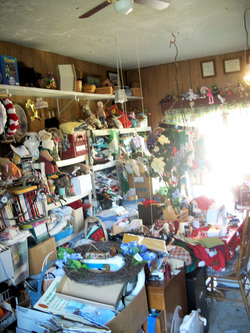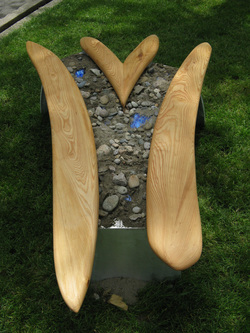 Hoarding, collecting, getting organized and staying organized seem to be very popular subjects these days. I subscribe to several magazines and each and every month there is at least one article about being or getting organized. Most magazines are focused heavily on organizing one’s self, home or office. The television shows, on collecting and hoarding, portray extreme cases, actually making you feel ill watching them. Hoarding seems to be happening in epidemic proportions. So are you a collector or a hoarder and what is the difference? The answer is you cannot be hoarding if you have not collected, but you can collect and not hoard, so they are separate terms. Hoarding is a negative behavior if the hoarding is creating an impoverished way of life. Collecting seems to be a much kinder way to look at the situation, yet it is the necessary key element and beginning act to hoarding. When someone has boxes, papers, collectibles, food products, gifts, animals and so much stuff it takes up their precious living space, until the point that they cannot even enjoy or use the stuff, it called Impoverished Wealth. You have so much stuff, stuffed in your home, you cannot even use or enjoy it. The money or time you spent collecting items, has now taken up your space for living, moving about and enjoying a fulfilled lifestyle. Collecting, on the other hand, if done as a hobby or for a purpose and does not turn into cluttered mess, can be quite enjoyable. I enjoy collecting art, artistic objects, books on decorating, Feng Shui, alternative health and herbal medicine. I have a place for everything. When I buy more then I have space for, I eliminate something and replace it with something I like better. The minute your stuff starts to fill entire rooms, garages and walk-ways you are probably collecting and hoarding too much stuff. Whatever is eliminated may go to family, friends or sold on Ebay.com or esty.com. Anything left from your purging can go to charity. Your taste in fashion and design changes about every 7-8 years, and so go to Town and get some new stuff, go ahead and collect and keep it around until it doesn’t please you aesthetically any longer. People who have a very difficult time letting go of “things”, even when the “things” are making their life impossible to enjoy, and who cannot stop bringing home “things”, that serve no purpose for them, are considered to be hoarding. I don’t like to call people “hoarders”, because they are not “hoarders”, they are PEOPLE who have a hole inside of them and they think they can fill up that hole with stuff. Generally I have found that people with collecting and hoarding behaviors have lost something, and they have not processed loss, therefore they have found some “things”, “items” and food or pets, which give them pleasure and fulfillment for that very moment. People with collecting and hoarding behaviors are generally the kindest, most loving and considerate people that live in our world. They have been wounded and they are licking their wounds with things that make them feel warm and fuzzy inside. I see people barricade themselves into their homes, and that is exactly what all the boxes, books, papers and stuff is, a barricade. People that create a barricade are people who have been wounded and hurt. The barricade is a sign that they have been violated, and had their boundaries crossed by intrusive, often times violent, and disrespectful people. Some people who hoard and barricade learned it from their childhoods, and many, at first, spent years working on being clean and orderly, yet ultimately fell into the same mire as their parents. When someone, with no background in helping people with collecting and hoarding behaviors, gets involved and starts to clean up or take power and control of the “things”, most people, that suffer from their collecting and hoarding, become VERY upset. I have seen people become very hypervigilant, depressed, angry, violent and sometimes psychotic if their property is even slightly disrupted. But what you have to remember is those “objects” that they have collected, and piled up, have been the replacement for what they already lost. The mind of a person who collects and hoards is very sharp, and calculative. They had to form that mind in order to function despite being hurt and wounded. Helping people who hoard, purge their obsolete and purposeless stuff, can be like playing chess, where if you cannot keep up with their diversions and desire to keep all of their” kings and queens”, both of you will lose and end up in a vicious cycle of hamster in the wheel. When you move highly charged stuff, the person has a relationship with, it is as if you are taking their mother, father, child, pet, husband, and wife or loved one that they lost all over again. A person will start to feel as if they are unraveling and will often start to, finally, process their loss. When this occurs you must, as the helper, be prepared to be supportive, loving and kind. Take a break and have the person fully realize their catharsis. You must tread lightly but firmly with someone who has strong relationships with their stuff! The first step is that the organizer and the client develop a relationship. Both people must agree that the time is correct, and that the person with collecting and hoarding behaviors stop collecting and hoarding. A verbal contract is a good idea. Second the person with collecting and hoarding behaviors must acknowledge that they are emotionally ready for the feat of sorting and clearing. And third a plan of how they will sort, clear and fill the space with beauty and harmony must be made. It is a very difficult and strenuous prospect, when homes are filled to the gills, but it can be done and completed within a short period of time. So get prepared to Get Organized Now! Call 949-709-7000 for a free 30 minute consultation if you are ready for some help. Also look on www.i-deal-lifestyle.com and read the blog and all about the staff who will help you get and stay organized.
0 Comments
Downsizing and Transitioning Your Parent |
Here, you will find an array of blog articles about living an ideal lifestyle and how to improve corporate business strategies.Marla is known as the Declutter Your Strategy™ expert. Marla earned her BA in Psychology and a Master's in Social Work. Stone is the founder of |


 RSS Feed
RSS Feed